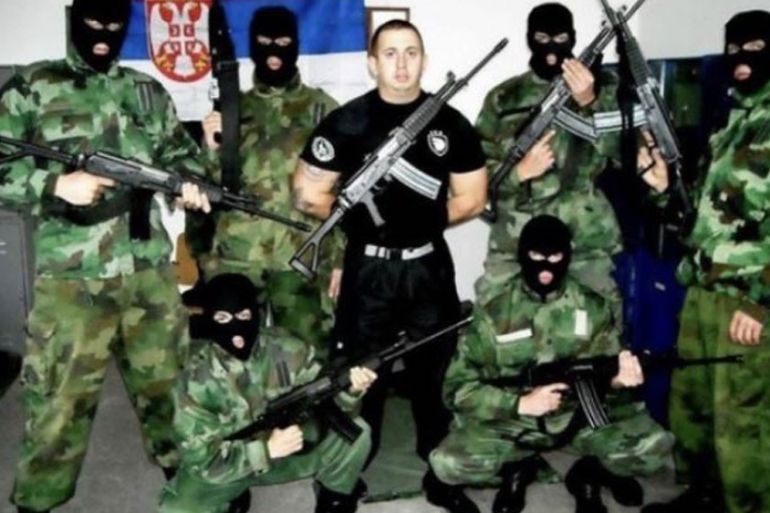Does the ‘Serbian Honour’ force have a Russian link?
Reported paramilitary force was put together by the president of Republika Srpska, and could be another example of Moscow’s meddling in the Balkans.

On Friday, the Bosnian news website Zurnal published a story on the alleged existence of a paramilitary force called Srbski ponos, or Serbian Honour.
The force, the website claimed, was being trained in a Russian centre in the Serbian city of Nis.
Keep reading
list of 4 itemsNATO allies must do more as Ukraine runs out of ammunition: Stoltenberg
Nordic tensions on the rise amid Russian anger over NATO accessions
Flag of NATO’s 32nd member, Sweden, raised at alliance’s headquarters
Milorad Dodik, leader of a Bosnian Serb nationalist party and president of Republika Srpska – a semi-autonomous entity within Bosnia and Herzegovina that was created in 1995 under the Dayton peace agreement – reportedly put the force together.
On the same day, Bosnian Minister of Security Dragan Mektic, a member of the Republika Srpska opposition Serb Democratic Party, confirmed to local media that there was indeed a paramilitary force recruiting and operating in Republika Srpska.
As Zurnal journalist Avdo Avdic revealed, members of this paramilitary force apparently underwent training in Serbia and Russia, while some gained military experience fighting alongside Russian separatists in Ukraine.
Members of the group also allegedly attended celebrations of Republika Srpska’s “statehood” day on January 9, organised by Dodik. These celebrations are held each year in defiance of a ruling by the country’s top court, deeming them unconstitutional.
According to the report, some of the members of the militia have criminal backgrounds.
A leaked security service document, cited in the report, said Dodik’s aides discussed the militia’s goals to include “possible intervention if the opposition seeks to obstruct the functioning of the authorities”.
The Russian connection
So where does the Russian connection come in?
In July 2018, NATO officials will be meeting in Brussels, where the enlargement strategy of the alliance will be discussed.
If you look at the NATO membership map, you would notice that, in the Balkans, Romania, Bulgaria, Greece, Albania, Montenegro, Croatia and Slovenia are all NATO member states. The only states that have not yet joined are Macedonia, Bosnia, Kosovo and Serbia.
Belgrade has made it all too clear that it has no interest in joining the Western military alliance, which bombed what was then Yugoslavia in 1995 and 1999. But the other three states are.
I have been told by a former high-ranking Bosnian defence official that Bosnia will get its Membership Action Plan (MAP) activated during the meeting in Brussels, which would be a formal step towards joining NATO.
Republika Srpska has been hindering this process for years now, by refusing the registration of all military assets. Political leaders in Republika Srpska like Dodik gravitate more towards Moscow and have even floated the idea of holding a referendum on joining NATO.
Russia would clearly not be happy if Bosnia joined.
If the Zurnal report is indeed true, this would not be Moscow’s first instance of meddling in Balkan politics.
In October 2016, Montenegrin authorities arrested Montenegrin, Russian and Serbian nationals, including former Serbian gendarmerie chief Branislav Dikic, and accused them of plotting a coup against the government.
Dikic is allegedly a fierce opponent of NATO presence in the Balkans and the plot was meant to prevent Montenegro from joining the alliance.
Despite the disturbances, in June 2017, Montenegro officially became a NATO member state, killing any hopes that Moscow might have had of a navy base on the Adriatic Sea.
Russia has also been accused of meddling in Macedonia. In June 2017, leaked classified documents from the country’s intelligence agency revealed that Russian spies and diplomats had been involved in a nearly decade-long effort to destabilise the country.
They have also backed pro-Russian nationalists who, of course, are opposed to the country’s potential membership in NATO.
It is interesting to note that Moscow’s interference in Macedonia, according to the leaked documents, started around 2008, when Greece blocked its attempt to join NATO due to the decades-long name dispute between the two countries.
In Bosnia, Russia has the sympathies of Dodik and his followers. How far that relationship can go is soon to be revealed. Bosnia and Herzegovina will have a general election in October this year.
Some Bosnians are already anxious about what could come out of this, having in mind Russia’s recent military interventions and what happened in Crimea and South Ossetia as a result.
Political recklessness and foreign meddling could destabilise the country and rekindle the old conflict.